I'm working on implementation of the Diamond-square algorithm but the outcoming heightmap looks strange like some points are not filled:

I've tried to change for stateents but I still can't find where these points can be missed. Here is my code of a function which is filling the one-dimensional heightMap of values between 0.0 and 1.0.
func diamond(x1 int, y1 int, x2 int, y2 int, l int, size int, r float32) {
var a, b, c, d float32
var cx, cy int
a = heightMap[x1 + y1*size]
b = heightMap[x1 + y2*size]
c = heightMap[x2 + y2*size]
d = heightMap[x2 + y1*size]
cx = (x2 - x1)/2
cy = (y2 - y1)/2
heightMap[cx + cy*size] = float32(a + b + c + d)/float32(4) + rand.Float32()*r
}
func square(cx int, cy int, l int, size int, r float32) {
var a, b, c, d float32
var isBorder = float32(0)
if cx == 0 {
isBorder = 1
a = 0
} else {
a = heightMap[cx - l/2 + cy*size]
}
if cy == size - 1 {
isBorder = 1
b = 0
} else {
b = heightMap[cx + (cy + l/2)*size]
}
if cx == size - 1 {
isBorder = 1
c = 0
} else {
c = heightMap[cx + l/2 + cy*size]
}
if cy == 0 {
isBorder = 1
d = 0
} else {
d = heightMap[cx + (cy - l/2)*size]
}
heightMap[cx + cy*size] = float32(a + b + c + d)/float32(4 - isBorder) + rand.Float32()*r
}
func initHeightMap(size int) {
rand.Seed(3256)
heightMap = make([]float32, size*size)
heightMap[0] = rand.Float32()
heightMap[size-1] = rand.Float32()
heightMap[(size-1)*size] = rand.Float32()
heightMap[size*size-1] = rand.Float32()
var t int
t = size - 1
for l := size - 1; l > 0; l /= 2 {
//diamond steps
for y := 0; y < size - 1; y += l {
for x := 0; x < size - 1; x += l {
diamond(x, y, x + l, y + l, l, size, float32(l)/float32(size-1))
}
}
//square steps
if l > 1 {
for y := 0; y < size - 1; y += l/2 {
if t%2 == 0 {
for x := l/2; x < size; x += l {
square(x, y, l, size, float32(l)/float32(size-1))
}
} else {
for x := 0; x < size; x += l {
square(x, y, l, size, float32(l)/float32(size-1))
}
}
t++
}
}
}
}
Size is a value which is always a power of 2 plus 1 and a random number range is halfed with l.
I've seen a similar heightmap in this question Unexpected Diamond square Algorithm results but there was a different mistake in the algorithm.